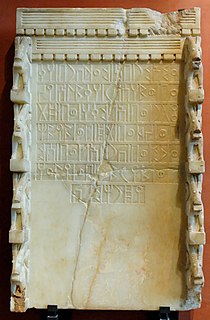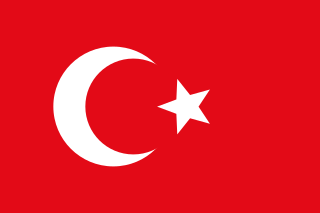
The history of Saudi Arabia as a nation state began with the emergence of the Al Saud dynasty in central Arabia in 1744 and the subsequent establishment of the Emirate of Diriyah. Pre-Islamic Arabia, the territory that constitutes modern Saudi Arabia, was the site of several ancient cultures and civilizations; the prehistory of Saudi Arabia shows some of the earliest traces of human activity in the world.

The history of Yemen describes the cultures, events, and peoples of what is one of the oldest centers of civilization in the Near East. Its relatively fertile land and adequate rainfall in a moister climate helped sustain a stable population, a feature recognized by the ancient Greek geographer Ptolemy, who described Yemen as Eudaimon Arabia meaning "fortunate Arabia" or "Happy Arabia". Yemenis had developed the South Arabian alphabet by the 12th to 8th centuries BC, which explains why most historians date all of the ancient Yemeni kingdoms to that era.

Ibrahim Pasha was a general in the Egyptian army and the eldest son of Muhammad Ali, the Wāli and unrecognised Khedive of Egypt and Sudan. He served as a general in the Egyptian army that his father established during his reign, taking his first command of Egyptian forces when he was merely a teenager. In the final year of his life, he succeeded his still living father as ruler of Egypt and Sudan, due to the latter's ill health. His rule also extended over the other dominions that his father had brought under Egyptian rule, namely Syria, Hejaz, Morea, Thasos, and Crete. Ibrahim pre-deceased his father, dying 10 November 1848, only four months after acceding to the throne. Upon his father's death the following year, the Egyptian throne passed to Ibrahim's nephew, Abbas.

The Arab Revolt or the Great Arab Revolt was a military uprising of Arab forces against the Ottoman Empire in the Middle Eastern theatre of World War I. On the basis of the McMahon–Hussein Correspondence, an agreement between the British government and Hussein bin Ali, Sharif of Mecca, the revolt was officially initiated at Mecca on June 10, 1916. The aim of the revolt was to create a single unified and independent Arab state stretching from Aleppo in Syria to Aden in Yemen, which the British had promised to recognize.
The history of Egypt under the Muhammad Ali dynasty (1805–1953) spanned the later period of Ottoman Egypt, the Khedivate of Egypt under British occupation, and the nominally independent Sultanate of Egypt and Kingdom of Egypt, ending with the Revolution of 1952 and the formation of the Republic of Egypt.
The Ottoman-Saudi War also known as the Ottoman/Egyptian-Saudi War (1811–1818) was fought from early 1811 to 1818, between the Ottoman Empire and the Emirate of Diriyah, the First Saudi State, resulting in the destruction of the latter.

The tribe of Shammar is a tribal Arab Qahtan confederation, descended from the ancient Yemeni tribe of Qahtan as they originated in Yemen before migrating into present day Saudi Arabia. It is one of the largest and most influential Arab tribes. The historical and traditional seat of the tribe's leadership is in the city of Ha'il in what was the Emirate of Jabal Shammar in Saudi Arabia. In its "golden age", around 1850, the tribe ruled much of central and northern Arabia from Riyadh to the frontiers of Syria and the vast area known as Al Jazira in Northern Iraq.

The Eyalet of Egypt operated as an administrative division of the Ottoman Empire from 1517 to 1867. It originated as a result of the conquest of Mamluk Egypt by the Ottomans in 1517, following the Ottoman–Mamluk War (1516–17) and the absorption of Syria into the Empire in 1516. The Ottomans administered Egypt as an eyalet of their Empire from 1517 until 1867, with an interruption during the French occupation of 1798 to 1801.

The Basra Vilayet was a first-level administrative division (vilayet) of the Ottoman Empire. It historically covered an area stretching from Nasiriyah and Amarah in the north to Kuwait in the south. To the south and the west, there was theoretically no border at all, yet no areas beyond Qatar in the south and the Najd Sanjak in the west were later on included in the administrative system.
Tusun Pasha was the younger son of Muhammad Ali Pasha, Wāli of Egypt between 1805–1849, by Amina Hanim. He was the father of Abbas I of Egypt (1812–1854) by princess Pembe Qadin. He is buried in Hosh al-Basha, the royal mausoleum of the royal family at the Imam al-Shafi'i, Cairo, Egypt.
The Battle of Al-Safra, took place in 1812 when Tusun Pasha's forces with its artillery and equipment moved forward trying to recapture Medina and met with Saud Al-Kabeer forces in a Valley of Al-Safra. Saud's army started attacking the Ottomans with 200 cavalry and about 10,000 men and successfully defended Medina. After three days of fighting the Ottomans withdrew back to their bunker in Yanbu.

The Battle of Medina took place in 1812. Following the Battle of Al-Safra, Tusun's forces begun to deal with rebel tribes around Medina while military supplies were moved to Yanbu from Egypt. Mohammed Ali Pasha sent Ahmet Aga with 10,000 men to help Tusun's forces to re-capture Medina, this army successfully took the city in November 1812, killing about 600 Saudi fighters.

The Battle of Jeddah was fought in 1813 at the west Arabian port city of Jeddah as part of the Ottoman–Saudi War. The Ottoman army of Tusun Pasha arrived from Medina, and a new army led by his father Mohammed Ali Pasha arrived from Egypt. The combined forces attacked and recaptured the city of Jeddah immediately, and the Ottoman-appointed Sharif was sent to Constantinople as a prisoner. A few days later, these combined forces captured Mecca itself, and Sultan Mahmud II restored Ghalib Efendi as the Sharif of Hejaz. From then on, the region of Hejaz again became a vassal to the Ottomans.

Ottoman return of Mecca 1813 also known as the Battle of Mecca happened several days after the recapture of Jeddah during the Ottoman–Saudi War. Diriyah's army and its 1,000 men in Mecca surrendered to Muhammad Ali of Egypt and Tusun Pasha, who recaptured the city for the Ottoman Empire.

The Unification of Saudi Arabia was a military and political campaign in which the various tribes, sheikhdoms, city-states, emirates, and kingdoms of most of the Arabian Peninsula were conquered by the House of Saud, or Al Saud. Unification started in 1902 and continued until 1932, when the Kingdom of Saudi Arabia was proclaimed under the leadership of King Abdulaziz, creating what is sometimes referred to as the Third Saudi State, to differentiate it from the Emirate of Diriyah, the First Saudi State and the Emirate of Nejd, the Second Saudi State, also House of Saud states.
Pasha, Pacha or Paşa, in older works sometimes anglicized as bashaw, was a higher rank in the Ottoman political and military system, typically granted to governors, generals, dignitaries, and others. As an honorary title, Pasha, in one of its various ranks, is similar to a British peerage or knighthood, and was also one of the highest titles in the 20th-century Kingdom of Egypt. The title was also used in Morocco in the 20th century, where it denoted a regional official or governor of a district.

The Vilayet of the Hejaz refers to the Hejaz region of Arabia when it was administered as a first-level province (vilayet) of the Ottoman Empire. At the beginning of the 20th century, it reportedly had an area of 96,500 square miles (250,000 km2). The Hejaz included all land from the southern border of the Vilayet of Syria, south of the city of Ma‛an, to the northern border of the Vilayet of Yemen, north of the city of Al Lith.

Muhammad Ali Pasha al-Mas'ud ibn Agha, also known as Muhammad Ali of Egypt and the Sudan, was the Albanian Ottoman governor and the de facto ruler of Egypt from 1805 to 1848, who is considered the founder of modern Egypt. At the height of his rule, he controlled all of Egypt, Sudan, Hejaz and the entire Levant.

The Al-Hasa Expedition was an Ottoman military campaign to conquer the El-Hasa region of eastern Arabia. The apparent goal of the campaign was to help Imam Abdullah bin Faisal regain his authority over Najd from his brother Saud bin Faisal, but the real goal was Medhat Pasha's desire to extend the influence of the Ottoman Empire over the Persian Gulf.
The Expedition to Najd (1836) was a military operation organised by Mehmet Ali that invaded Najd after the refusal of tribute payments by its ruler, Faisal bin Turki Al Saud.













